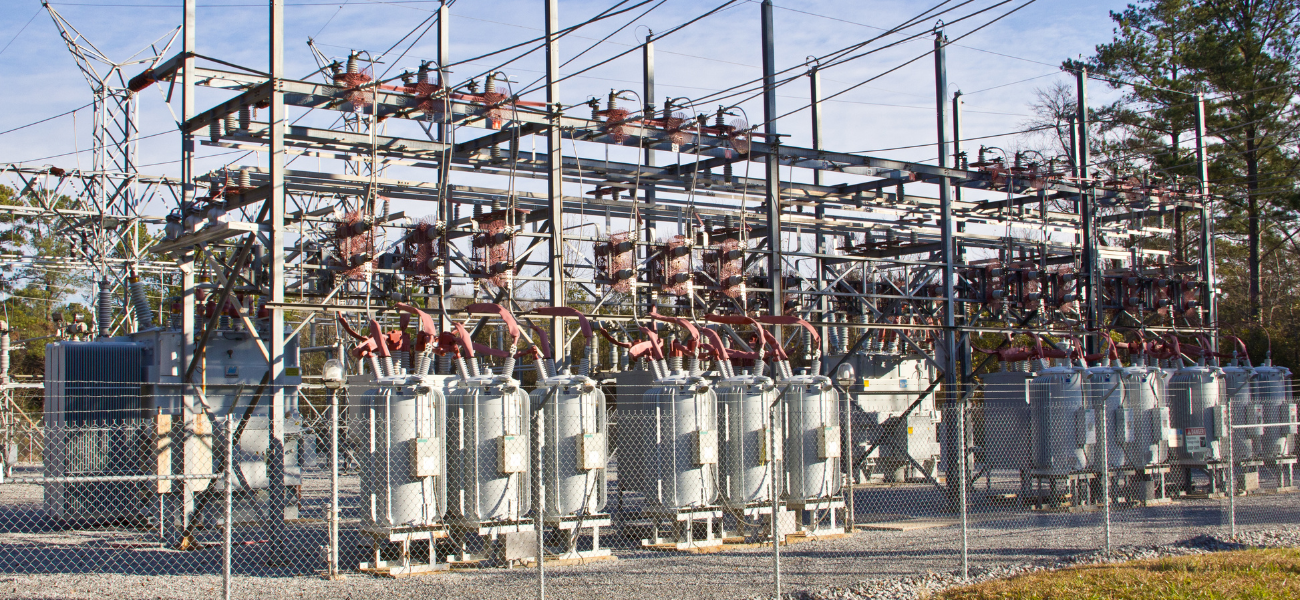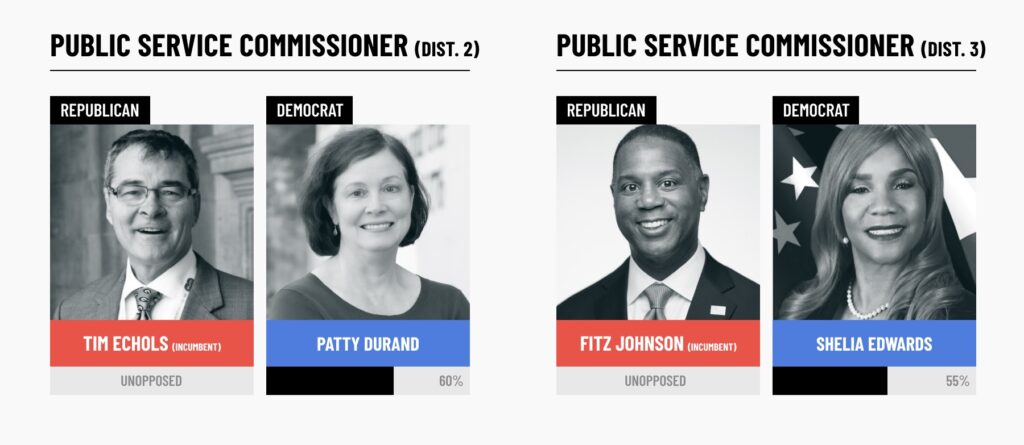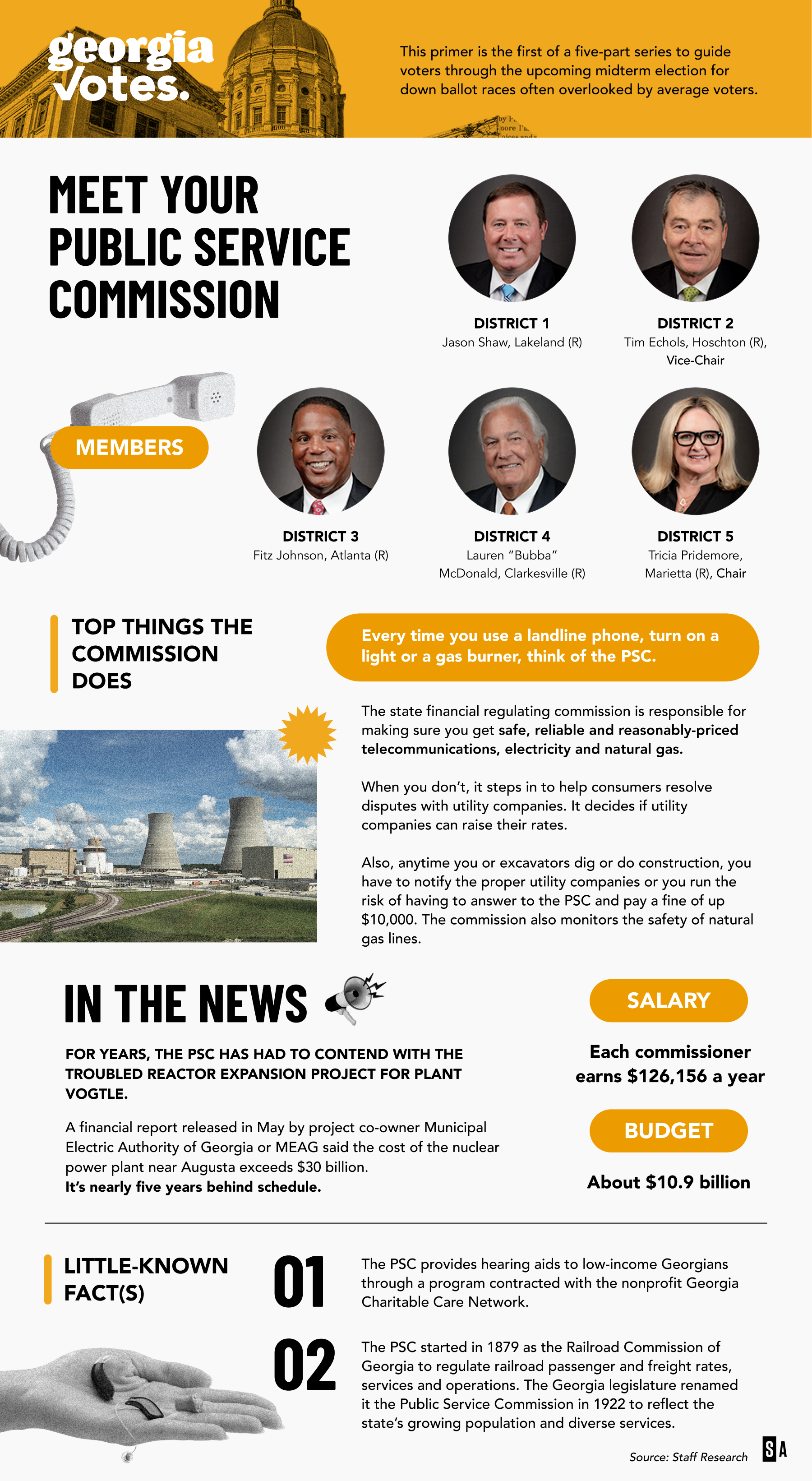Stay ahead of the curve as a political insider with deep policy analysis, daily briefings and policy-shaping tools.
Request a DemoPublic Service Commissioners: Keeping the Lights On

Georgia Power Transformer Station (Credit: kenteegardin)
Editor’s Note: Georgia voters won’t get to choose new public service commissioners in the Nov. 8 midterm election after all. The U.S. Supreme Court stepped into the contentious legal battle last week, ruling that the 11th Circuit Court of Appeals was wrong to block a lower court’s decision to delay the two races until after Georgia lawmakers replace the district-seat, statewide election process. U.S. District Court Judge Steven Grimberg said the at-large election process violated the federal Voting Rights Act by impeding Black voter’s ability to elect their preferred candidates.
This primer is the first of a five-part series to guide voters through the upcoming midterm election for Georgia agriculture, labor, insurance and public service commissioners as well as the superintendent of schools – down ballot races often overlooked by average voters. Over the next two weeks, State Affairs will explain how what happens in these offices impact your life.

The Gist
Many Georgians will go to the polls in November knowing little, if anything, about what some of the jobs on the ballot entail.
Take the Public Service Commission (PSC), for example. It’s a five-member state utility regulatory panel that touches people’s lives every time they pick up their landline phone, flip a light switch or turn on the gas burner on their stove.
Here’s what you need to know.
What’s Happening
Unless there’s a big squabble over utility rates or the continuing saga over the financially-bloated, slow-moving expansion plans at the nuclear power facility, Plant Vogtle, the PSC is rarely in the news or garners much public attention.
“The average person doesn’t even know there is a PSC,” said Atlantan Robert Searfoss, who dealt with the commission on electric and telephone rate cases on behalf of the Georgia Hospital Association. Now retired, Searfoss follows the PSC as an environmental activist, and he’s pretty frugal when it comes to using any sort of utility service.

“My average power bill is $10, $12 a month,” he said, adding that at his house, “You’re going to freeze in the winter and cook in the summer. I’m very economical. So in terms of dollars, the impact on me is very small. But I don’t care. They’re reaching into my pocket and taking money.”
The Public Service Commission makes decisions that significantly impact Georgians, said Liz Coyle, executive director of Georgia Watch, a consumer advocacy group. The commission sets the rates utilities can charge customers on monthly power and gas bills, generating billions of dollars over the years.
A case currently before the commission, for example, could cause electric bills to go up as much as 12% in January, Coyle said. The utility regulatory panel also makes policies that influence how much energy in Georgia comes from clean, renewable sources, and whether to expand efficiency programs that lower energy use and costs.
For climate and environmental justice advocate Brionté McCorkle, it boils down to kitchen table issues.
“The Public Service Commission is the most kitchen table [job] of any elected position, because it literally deals with the bills that come across your kitchen table every month,” said McCorkle, who pays about $400 a month in gas and light bills.
Earlier this month, however, the usually obscure state regulatory body made news.
A federal judge ruled Georgia’s statewide — or at-large — PSC elections illegally weakened Black voter representation, thus violating the federal Voting Rights Act. U.S. District Judge Steven Grimberg’s decision put the PSC District 2 and 3 races in jeopardy briefly.
State Attorney General Chris Carr appealed to have the two races put back on the November ballot. On Friday, an appeals court complied.

“We’re disappointed,” Atlanta civil rights attorney Bryan Sells said Friday of the 11th Circuit Court of Appeals’ decision.
Sells, the lead attorney for the plaintiffs in the Rose v. Raffensperger case, declined to say whether he will seek an appeal.
Why It Matters
Judge Grimberg’s ruling effectively upends a nearly century-old method that Georgia has used to elect its utility regulators. It also could lead to a major revision of how Georgia elects its five commissioners. Currently, while they must live in the district they represent, they are elected by voters statewide. Under recent redistricting, District 3 shrunk to three metro Atlanta counties: Clayton, DeKalb and Fulton. District 2 grew dramatically to 38 counties that run from Banks County at the foothills of the north Georgia mountains to coastal Chatham County.
The two-year-old lawsuit stems from decisions that disproportionately discriminated against Black Georgians. For instance, after suspending power disconnections during the pandemic, Georgia Power resumed the practice last summer.
The district court’s decision is seen as a major victory for voting rights advocates – and voters.
“No one’s ever done an at-large vote dilution claim for a statewide seat,” said McCorkle, executive director of Georgia Conservation Voters, a climate and environmental justice advocacy group, and one of four plaintiffs in the case. “It worked out really well because all of [the plaintiffs] basically lived in District 3, which is the most obvious district where the voter dilution is occurring. If you look at the elected officials in metro Atlanta, they’re almost overwhelmingly Black and Democratic or progressive. So, to have a white male representing the District 3 seat for over 100 years is insane.
“We found out through the court case that 66% – or two out of every three shut offs – were Black people,” McCorkle added. Such decisions were made by a board that, at the time, had no Black commissioners.
Businessman and Army vet Fitz Johnson was appointed last year by Gov. Brian Kemp to fill the District 3 vacancy, becoming only the second Black to ever serve on the commission. David Burgess, a 17-year PSC staffer and public utility engineer, became the first Black on the PSC when he was appointed in 1999 by then-Gov. Roy Barnes.
What’s Next?
It’s unclear how the PSC’s legal battle will proceed. The 11th Circuit approved the state’s request about the November elections but didn’t rule on the larger question: the constitutionality of how commissioners are elected.
“We’re still confident the district court’s decision will ultimately be upheld on appeal,” Sells said. “The 11th circuit didn’t say anything about whether the ruling is correct or not. So they did not overturn it. They did not suggest that it was wrong. They just put it on hold, because they determined it’s too close to the election.”
When asked if he will appeal, Sells replied: “We haven’t decided on our next steps yet.”

Join the Conversation
What else do you want to know about the Public Service Commission, voting or elections in Georgia? Share your thoughts/tips by emailing [email protected]
Read State Affairs’ Georgia Votes 2022 series.
Part II: Department of Agriculture: Where poultry, pie, pump and puppy meet
Part III: State School Superintendent: Educating our country’s future
Part IV: Ups and downs of the Insurance and Safety Fire Commissioner
Part V: MIDTERM ELECTION OF LABOR COMMISSIONER KEY IN STATE’S POST-PANDEMIC RECOVERY
Professionals still face licensing delays amid state’s transition to online system
The Gist Georgia’s professionals and business owners are still struggling to obtain professional licenses in a timely manner. As the Secretary of State’s Office rolls out its new Georgia Online Application Licensing System to expedite the process, the efficiency of this new process is being put to the test. What’s Happening Thursday morning at the …
Controversy over AP African American Studies class grows
Rashad Brown has been teaching Advanced Placement African American Studies at Atlanta’s Maynard Jackson High School for three years. He’ll continue to do so — even though the state’s top education official removed it from the list of state-funded course offerings for the upcoming school year. While Brown prepares to start teaching his class on …
Students, teachers, lawmakers blast decision to end AP African American history classes
ATLANTA — A coalition of lawmakers, civil rights leaders, clergy, educators and students Wednesday called on the state’s education czar to rescind his decision to drop an advanced placement African American studies class from the state’s curriculum for the upcoming school year. “This decision is the latest attack in a long-running GOP assault on Georgia’s …
Kamala Harris’ presidential bid reinvigorates Georgia Democrats
Georgia Democrats have gained new momentum heading into the November election, propelled by President Joe Biden’s decision to bow out of his reelection bid and hand the reins to Vice President Kamala Harris. The historic decision, announced Sunday, is expected to prove pivotal in the national and state political arenas and breathe new life and …




